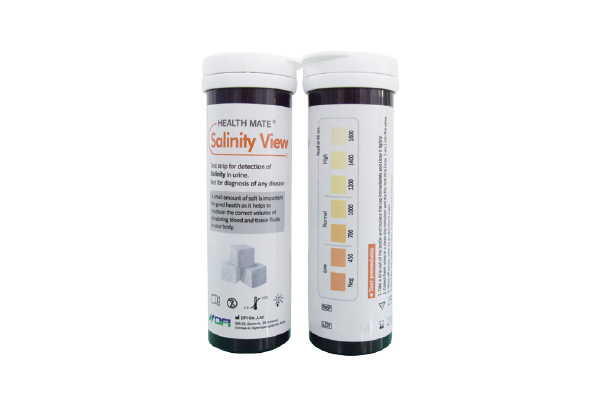HEALTH MATE™ Salinity
본문

![]() Test strips for detection of salinity amount in urine
Test strips for detection of salinity amount in urine
| Measurement Item | Salinity (Salt amount in Urine) |
|---|---|
| Testing Method | Dipstick / Semi-quantitative / Colorimetric |
| Reaction Time | 60 sec |
| Storage | 2~30℃ |
| Shelf Life | 18 months |
Why you need to check Salinity level?
A small amount of salt is important for good health as it helps to maintain the correct volume of circulating blood and tissue fluids in the body.
But, too much salt can cause high bold pressure and many other health conditions.
Reducing the amount of salt you have will lower high blood pressure-the extent depends on your age, current blood pressure and other factors such as the amount of exercise you do, body weight, stress and alcohol intake.
Finally, salinity test can find out whether you have eat adequate amount of salt or not, and it is can help to control your food habit.
Result Interpretation

Abnormal Results
Low levels of sodium in your urine may indicate kidney problems.
Symptoms include:
Fatigue, nausea and vomiting, headache, loss of appetite, confusion or disorientation, hallucinations, loss of consciousness or coma
The causes of low sodium in the urine are most likely:
Diarrhea, excessive sweating, kidney damage (e.g., glomerulonephritis, hepatorenal syndrome, kidney failure), cirrhosis of the liver high levels of the hormone, aldosterone, congestive heart failure
High levels of sodium in the urine may be due to diet, kidney problems, or hypernatremia.
Symptoms include:
Thirst, fatigue, swelling in hands and feet weakness, Insomnia, rapid heartbeat, coma
The causes of high sodium in the urine may be:
high-sodium diet, certain medications, such as diuretics, problems with adrenal gland function
salt-losing nephropathy (Bartter syndrome)


